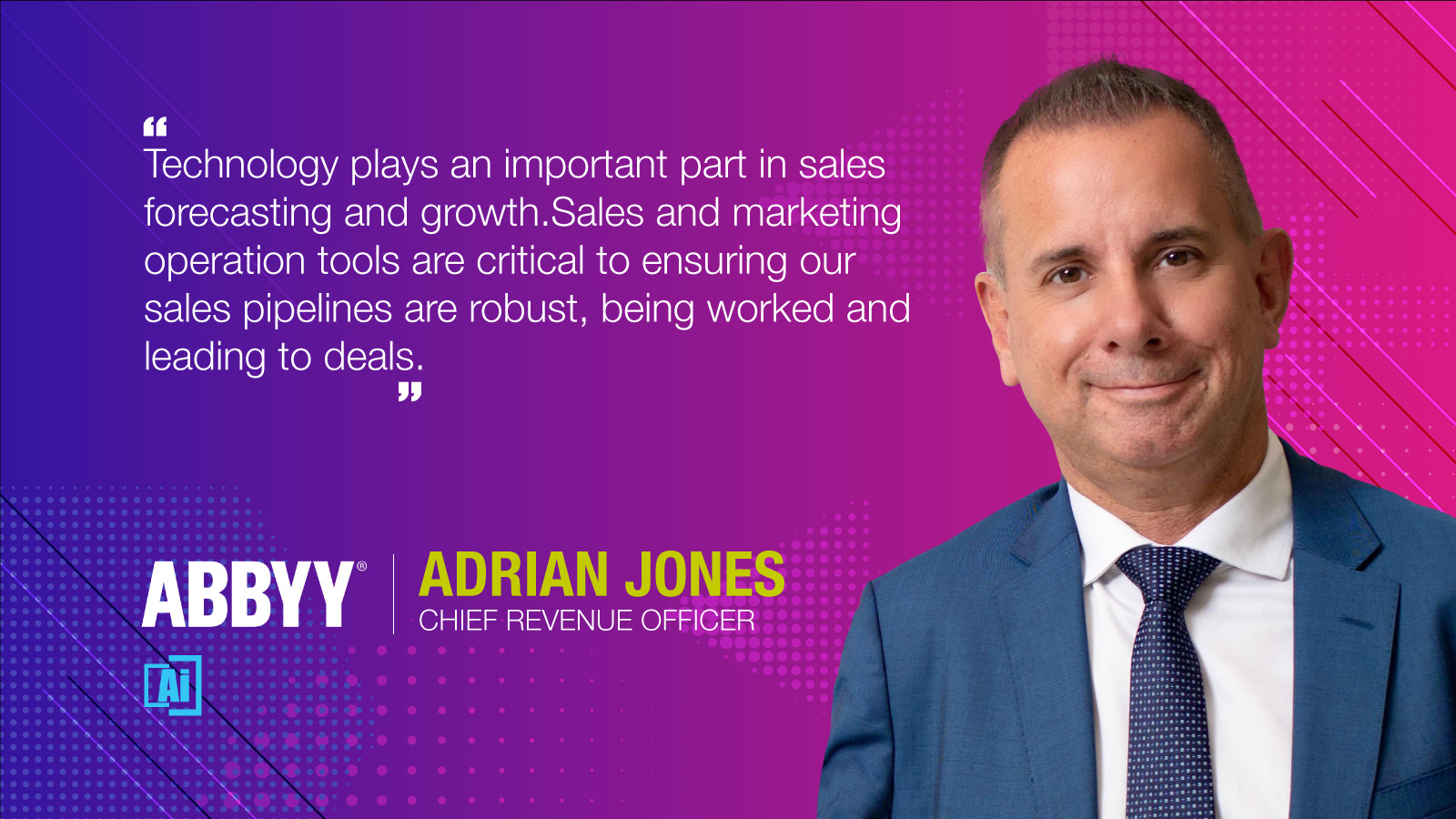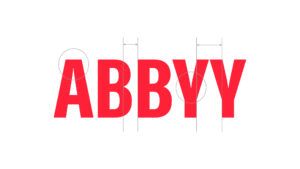AiThority Interview with Adrian Jones, Chief Revenue Officer at ABBYY

Hi Adrian, please tell us about your journey in technology. How did you arrive at ABBYY?
I’ve been interested in technology since my youth. I was one of those lads who would take apart a TV to see how it worked. This instinctive interest in technology led me to attend university at Oxford to pursue electrical engineering. I eventually made way to the sales side, and over the course of my career I’ve had the opportunity to lead global sales teams at several market-leading tech companies, including Automation Anywhere, Symantec, Oracle, and Hewlett Packard. Being in the automation space for many years, I was always aware of ABBYY. But it was when my former colleague Robert Youngjohns, now ABBYY’s current Chairman of the Board, reconnected with me that I learned more about ABBYY’s intelligent automation offerings. I was blown away by the technology and market opportunity. ABBYY has all the right ingredients for success – great people, great technology, and a great culture.
Could you tell us more about your role and responsibilities at ABBYY?
I am currently the Chief Revenue Officer (CRO) for ABBYY, a global US-based company with more than 5,000 customers, including many of the Fortune 500. As CRO, I lead go-to-market strategies for several business groups within the company that impact revenue generation. This includes sales, demand generation and customer support. In my role, I orchestrate and unify global processes to ensure the customers’ needs are at the center of everything we do, which will directly impact stronger corporate growth.
Recommended: AiThority Interview with Scott Finlow, Global CMO at PepsiCo Foodservice
How has the global sales market changed in the last 2-3 years? How has the pandemic influenced the B2B tech market?
The most significant change within the past two years is in the speed in which companies selected and deployed new solutions. Proof of concept trials no longer took six to nine months, nor do they need to. A big factor to this shortened sales cycle is the decision makers were narrowed to executive management. IT was no longer the gate keeper. Executives responsible for how their business units ran took the reigns to ensure they could support employees and customers. However, one drawback we’ve heard from many of the companies we’re now working with is they were often over-promised solutions’ capabilities and have buyer’s remorse. This doesn’t mean that the sales cycle needs to revert to longer lead times, rather, it is a lesson that innovation teams need to get their hands on solutions to see if they’re really as easy to use and perform as well as promised, opt for the growing number of no-code platforms on the market, and make sure they’re not getting locked into inflexible platforms.
Why do we see a sudden peak in the demand for automation platforms and solutions? How is ABBYY positioned in this growing technology market?
Companies out of necessity had to fast forward their automation roadmaps to accommodate work-from-home and augment employees’ work. Still, some regions are more aggressive than others, for example, Asia has strong growth, while Europe is somewhat more conservative. Overall, there is an openness to new technologies. My goal is to help organizations better understand their automation challenges, show them how ABBYY solutions can power any intelligent automation platform they have, and let them see how quickly they can achieve ROI in cost saving, productivity increases, and improved customer engagement.
What are your goals for 2022, and how do you leverage technology to forecast your results versus effectiveness in sales development?
I want ABBYY to become a household name, be known as the number one player in Intelligent Document Processing and Process Mining in the world and be THE brand for driving intelligent automation in the enterprise. I want to see consistent year-over-year revenue growth and we’ll do this with our higher value products ABBYY Timeline and ABBYY Vantage to create better business outcomes for customers.
With that said, technology plays an important part in sales forecasting and growth. Sales and marketing operation tools are critical to ensuring our sales pipelines are robust, being worked and leading to deals.
Recommended: AiThority Interview with Srini Srinivasan, CTO & Founder at Aerospike
What are your greatest sales hacks learned during your tenures with some of the biggest technology providers? Any tips you could share with our audience?
The number one tip is to always LISTEN. Many salespeople are too eager to tell the bells and whistle of the solution without fully understanding potential customers’ challenges. Ask questions and let customers tell you what they need and what’s been tried. Also, this may be counterintuitive to most salespeople who have an innate competitive drive but be humble. Do not think you know it all no matter how many years you’ve been in the industry. Also, I recommend that you do many different jobs within a company to give you a well-rounded amount of experience.
What are the major challenges in any cloud transformation journeys? How does ABBYY help customers identify these challenges and deliver optimal solutions?
Most technologies today are based in the cloud out of necessity to meet the demands of the hybrid workforce so I will be more specific with the top challenges during the intelligent process automation (IPA) journey, a market that IDC estimates will be $17.3 billion by 2023. IDC describes the IPA software market as “a collection of software tools and platforms used to simplify, automate, and manage processes and to coordinate, connect, and control distributed processes.”
The first challenge with IPA is getting the data within documents to fuel processes. This is a highly manual process that has required employees to manage – either by entering the information into databases or by correcting antiquated document capture software. The second challenge is the ability to have processes perform optimally. Many employees skip steps in a process to get to the end result faster, and therefore risk compliance, or cause errors and delays to customers due to not following processes correctly.
ABBYY helps enterprises from a two-prong approach. ABBYY Vantage is a low-code/no-code IDP platform that allows organizations to add any new document into a business process as easy as drag, drop, and deploy. Using document AI, companies no longer need machine learning or OCR specialists and empower business users to access an online marketplace full document skills that understand the content and context of documents just like a human can. The relevant data is then automatically and accurately added into enterprise applications.
To ensure processes are performing efficiently, ABBYY’s process mining and discovery and task mining solution, ABBYY Timeline, creates a digital twin of business processes to show a real-time representation of a process workflow, common bottlenecks and variants, the time sequence between steps, and how people’s interactions with system applications affect the workflow. With this facts-based analysis of how business processes are truly performing, leaders can bring employees along and to promote understanding and acceptance for new solutions and processes within the company.
Recommended: AiThority Interview with Mike Bechtel, Chief Futurist at Deloitte Consulting
How important is it for Cloud-based automation companies to understand the pain points associated with creating the “modern hybrid workplaces” for the customers? How do these pain points shape the future of workplace culture?
If companies don’t understand the pain points associated with document-centric processes – straight-through processing and efficiently running workflows – their automation projects will not deliver the results as expected, risk being abandoned, cost more in consultancy services, or fail. This will be detrimental to the employee and customer experience. It’s important to work with a partner that is platform agnostic and can help you navigate the modern hybrid workplace with cloud and low-code/no-code solutions.
Thank you, Adrian! That was fun and we hope to see you back on AiThority.com soon.
[To share your insights with us, please write to sghosh@martechseries.com]
For more than two decades, I have successfully run large sales organizations from Europe to the USA and Asia for some of the most well-known and demanding Fortune 100 IT organizations. Currently, I’m Chief Revenue Officer at ABBYY, the leading company in the Digital Intelligence and powering the Automation market. I also serve as Chairman at Talisman, one of the most disruptive players in sports marketing, and a Senior Advisor of Warburg Pincus, a leading global private equity firm focused on growth investing.
I have led strong multi-billion dollar organizations such as Hewlett-Packard, Oracle ,Symantec and Automation Anywhere and am a focused IT executive with a passion for technology and sports.
ABBYY powers intelligent automation. We reimagine the way people work and how companies accelerate business by delivering the intelligence that fuels automation platforms. Our solutions transform enterprise data and empower you with the insights you need to work smarter and faster. We help more than 5,000 companies globally, including many of the Fortune 500, to drive significant impact where it matters most: customer experience, profitability, and competitive advantage.


Comments are closed.